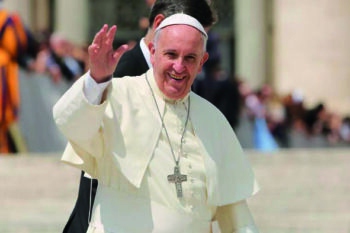On praying with the Scriptures
 On praying with the Scriptures
On praying with the Scriptures
The words of Sacred Scripture were not written to remain imprisoned on papyrus, parchment or paper, but to be received by a person who prays, making them blossom in his or her heart. The Word of God goes to the heart. The Catechism affirms that: “prayer should accompany the reading of Sacred Scripture” — the Bible cannot be read like a novel — “so that a dialogue takes place between God and the person” (n. 2653). This is where prayer leads you, because it is a dialogue with God. That Bible verse … was written for each of us.
This experience happens to all believers: a passage from Scripture, heard many times already, unexpectedly speaks to me one day, and enlightens a situation in which I am living. But it is necessary that I be present on that day for that appointment with the Word. That I be there, listening to the Word. Every day God passes and sows a seed in the soil of our lives. We do not know whether today he will find dry ground, brambles, or good soil that will make that seed grow (cf. Mark 4: 3-9). That they become for us the living Word of God depends on us, on our prayer, on the open heart with which we approach the Scriptures. God passes continually through Scripture.
Encountering God
Through prayer a new incarnation of the Word takes place. And we are the ‘tabernacles’ where the words of God seek to be welcomed and preserved, so that they may visit the world. This is why we must approach the Bible without ulterior motives, without exploiting it. The believer does not turn to the Holy Scriptures to support his or her own philosophical and moral view, but because he or she hopes for an encounter; the believer knows that those words were written in the Holy Spirit, and that therefore they should be welcomed and understood in that same Spirit, so that the encounter can occur.
It bothers me a little when I hear Christians who recite verses from the Bible like parrots. “Oh, yes… Oh, the Lord says… He wants this…”. But did you encounter the Lord, with that verse? It is not only a question of memory: it is a question of the memory of the heart, which opens you to the encounter with the Lord. And that word, that verse, leads you to the encounter with the Lord.
The Bible was not written for a generic humanity, but for us, for me, for you, for men and women in flesh and blood, men and women who have a name and a surname, like me, like you. And when the Word of God, infused with the Holy Spirit, is received with an open heart, it does not leave things as they were before: never. Something changes. And this is the grace and the power of the Word of God.
Through prayer, the Word of God comes to abide in us and we abide in it. The Word inspires good intentions and sustains action; it gives us strength and serenity, and even when it challenges us, it gives us peace. On ‘bad’ and confusing days, it guarantees to the heart a core of confidence and of love that protects it from the attacks of the evil one.
The Word made flesh
In this way the Word of God is made flesh — allow me to use this expression: made flesh — in those who receive it in prayer. The intuition emerges in some ancient texts that Christians identify so completely with the Word that, even if all the Bibles in the world were to be burned, its ‘mould’ could still be saved through the imprint it left on the life of the saints. This is a beautiful expression.
An inexhaustible treasure
Christian life is at the same time a work of obedience and of creativity. Good Christians must be obedient, but they must also be creative. Obedient, because they listen to the Word of God; creative, because they have the Holy Spirit within who drives them to be so, to lead them forward. At the end of one of his discourses addressed in the form of parables, Jesus makes this comparison: “Every scribe who has been trained for the kingdom of heaven is like a householder who brings out of his treasure” — the heart — “what is new and what is old” (Matthew 13:52). The Holy Scriptures are an inexhaustible treasure. May the Lord grant us all to draw ever more from them, though prayer. Thank you.
From the Pope’s General Audience in the Library of the Apostolic Palace, 27 January 2021
Source: vatican.va

 Entries(RSS)
Entries(RSS)